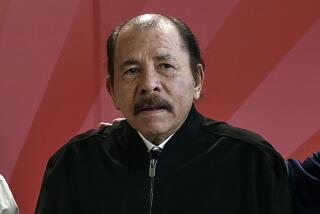U.S. Memo Criticizes Nicaragua as Powell Makes a Goodwill Visit
- Share via
TEGUCIGALPA, Honduras — When Secretary of State Colin L. Powell and his diplomatic team visited Central America this week, the goal was to strengthen ties -- not to suggest that their hosts were backward, insular and self-destructive.
Yet that was the upshot of the background memo about Nicaragua that was distributed to the media by the U.S. Embassy in Managua as Powell’s group spent two days in Panama, Nicaragua and Honduras.
The memo said that in Nicaragua, political parties spend so much time fighting with each other that “democracy usually takes a back row to personal political interests.”
The country “crawls along as the second-poorest country in the hemisphere after Haiti, battered by storms of nature and of their own making, with little hope of things changing in the future,” it said.
Most Nicaraguans, according to the memo, “are subsumed by the struggle to find the next plate of rice and beans and, therefore, have little time to think about the United States or world affairs in general.” Meanwhile, a more affluent minority of Nicaraguans “prefer to dress in Ralph Lauren shirts, drive large Ford SUVs, watch American movies, and when going out for a meal, brag that they go to TGI Friday’s.”
Nicaraguan officials were not immediately available for comment, but a senior U.S. official, who requested anonymity, said the analysis was not the official U.S. view. He said the memo consisted of “gross generalizations and a not very good analysis.”
The official said the embassy does not have plans to sack the public affairs staffer who wrote it, but added: “Counseling is in order.”
On Monday, Powell urged Nicaragua to destroy thousands of shoulder-fired antiaircraft missiles. But army chief Gen. Javier Carrion rejected the idea Tuesday, saying the nation did not want to be at a military disadvantage, Reuters reported.
As Powell’s team stopped Tuesday in Honduras on the last leg of its journey, the Honduran president said hope for financial help for his poor nation was among the reasons the country sent 370 troops to participate in the reconstruction of Iraq.
President Ricardo Maduro said the United States “has always been a friend of Honduras.” He noted that, among other things, the United States has canceled hundreds of millions of dollars of debt his nation owed.
Maduro said Honduras also wanted to be part of the international economic system, and that it would not be “logical ... or legitimate” for the country to accept aid, then hesitate when asked for support.
Honduran troops have been patrolling the area around Najaf in south-central Iraq since the summer. Maduro said new contingents would be rotated in at six-month intervals “as long as they are needed.”
The visits were Powell’s first to each country as secretary of State. He urged leaders to keep up the fight against the drug trade and move forward with efforts to reduce government corruption, strengthen democratic institutions and reform their economies.
The Bush administration is weighing a proposal to create a Central American free-trade area as a way to invigorate economies that are still heavily dependent on agriculture.
Although stubborn problems remain, Powell said, the region had made impressive progress since the 1980s, when Nicaragua was ruled by the Marxist Sandinistas and Panama was run by strongman Manuel Noriega. Noriega was overthrown in 1989 by a United States invasion and the Sandinistas were voted out. They now compete as a minority political party in Nicaragua.
*
(BEGIN TEXT OF INFOBOX)
Unofficial analysis
An unsigned U.S. Embassy memo distributed to reporters during a trip to Central America with Secretary of State Colin L. Powell painted a bleak picture of life in Nicaragua.
* “In summary, Nicaragua crawls along as the second-poorest country in the hemisphere after Haiti, battered by storms of nature and of their own making, with little hope of things changing in the future.”
* “Most Nicaraguans are subsumed by the struggle to find the next plate of rice and beans and, therefore, have little time to think about the United States or world affairs in general.”
* By contrast, members of the educated, pro-U.S. elite “prefer to dress in Ralph Lauren shirts, drive large Ford SUVs, watch American movies, and when going out for a meal brag that they go to TGI Friday’s.”
Source: Reuters
Los Angeles Times
More to Read
Sign up for Essential California
The most important California stories and recommendations in your inbox every morning.
You may occasionally receive promotional content from the Los Angeles Times.














